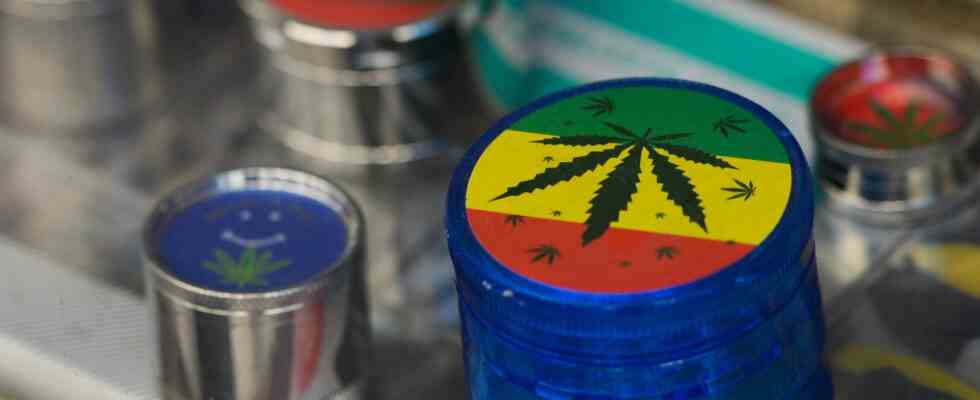background
Status: 07.09.2022 06:34 a.m
In Prague, the drug commissioners of the EU countries want to talk about a more progressive cannabis policy. The positions of the member states could hardly be more different.
In a parking garage, the Polish rapper Mata enjoys smoking a joint. It’s a scene from his music video for the song “Patointeligencja”. It quickly became an internet phenomenon and was viewed more than 60 million times on YouTube by September 2022.
In real life, the 22-year-old, whose real name is Michał Matczak, was caught with 1.5 grams of marijuana in late January. The police searched his home and he and his friend spent the night in police custody. According to Polish law, he could face up to three years in prison.
Many people in Poland feel like the rapper, because the country has a strict drug policy: Possessing, consuming and growing marijuana is a criminal offence. However, the rapper’s case revived the drug debate in Poland. Most commentators, including Die Linke and Civic Platform politicians, call for the current law to be liberalised. On the other hand, there are voices like that of Janusz Kowalski of the right-wing party Solidarna Polska, who have suggested even tougher penalties for drug possession.
It’s completely different in the Netherlands, Estonia, the Czech Republic, Portugal and Spain: anyone who wants to smoke or buy cannabis there can assume that there will be no criminal consequences. Dutch coffee shops have been allowed to sell cannabis for personal use since the mid-1970s. However, the purchase was never regulated, which led to new problems: the gap is filled by drug gangs, who in turn use their network for cocaine trafficking.
Decriminalized Portugal
A good example of a decriminalization of cannabis that has been accepted by the EU so far is therefore Portugal. Since 2001, anyone who smokes a joint there is no longer liable to prosecution. Not even if you give yourself an injection. The amounts are precisely set: ten daily doses of 2.5 grams of marijuana – anyone caught with it risks a fine, but no charge.
Portugal is also investing in combating drug addiction and has therefore formed responsible commissions made up of lawyers, social workers and psychologists. In such conversations, those affected are asked about their consumption and asked to reflect on it.
The European Monitoring Center for Drugs and Drug Addiction (EMCDDA) is also based in Lisbon. The current drug report states that more and more synthetic cannabis is entering the European market. This can lead to heart attacks, unconsciousness and psychosis. EU-wide legalization could dry up the trade in contaminated weed, proponents say.
Cannabis market is becoming more complex
Belgium is also one of the countries that at least turns a blind eye to cannabis use. Anyone who has a small amount of less than three grams for personal use or grows a single plant only risks confiscation and a fine of up to 25 euros.
However, the concept of cannabis social clubs is not only booming in Belgium: non-commercial associations organize the collective cultivation of marijuana plants in halls – not only, but also for medical use. Only members can grow one plant at a time.
The initiators use a legal gray area. Because there is no regulation for the cultivation of cannabis with no more than 0.2 percent THC content for personal use. This also means that shops selling hemp-based products with the non-intoxicating active ingredient CBD are springing up in and around Brussels.
Liberal image, strict politics
Despite its progressive image, Sweden has a zero-tolerance policy on drugs. Even possession of small amounts of cannabis is a criminal offense. A 2014 report found that cannabis use in Sweden is higher than in Portugal, where drug possession was largely decriminalized in 2001. Other studies show: Although consumption in Sweden has increased in recent years, it is low compared to other European countries. Last year, according to the Swedish health authority, 2.6 percent of 16 to 84 year olds said they had used cannabis in the past 12 months.
In Italy, after the elections at the end of September, observers expect a step backwards in the currently rather progressive cannabis policy. It is true that there are no concrete references to this in the programs of the Lega or the Fratelli d’Italia. But the party leaders Matteo Salvini (Lega) and Giorgia Meloni (FDI) have already announced that they want to go on the barricades if a complete legalization of cannabis is in the air.
With assistance from Franka Welz (ARD Studio Madrid), Anneke Wardenbach and Raphael Jung (ARD Studio Warsaw), Julia Wäschenbach (ARD Studio Stockholm) and ARD Studio Rome

